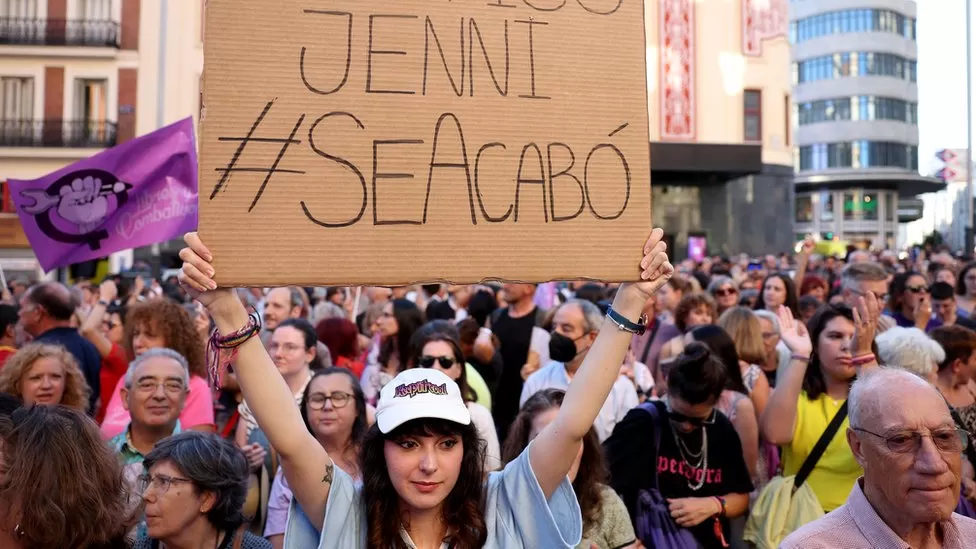It has been a tumultuous week for women's football, as it deals with the aftermath of Luis Rubiales kissing Spanish national star Jenni Hermoso on the lips at the Women's World Cup final.
The row over the Spanish football president's actions, broadcast and seen by millions, has spilled over well beyond Spain and the sport, and struck a chord with women around the world. Spain's top criminal court on Monday launched a preliminary investigation into whether his actions amounted to a crime of sexual assault.
Rubiales has strenuously denied any wrongdoing. He has repeatedly stated that the kiss was consensual and that he is the victim of “social assassination”. Hermoso has stated there was no consent. The Spanish football federation, however, later questioned her claim and threatened legal action for “lies”.
Teresa Parker from Women's Aid, a charity that supports women and children facing abuse, says the way the incident has played out so far has resonated with many women.
“This is exactly why many women do not come forward to report harassment or abuse,” she said, adding that what had happened would seem to many to go “beyond gaslighting”.
“We are being asked to ignore what you can see on film, and to dismiss a woman when she says she didn't consent. It is an outrageous situation.”. Gaslighting is a form of emotional manipulation, where the victim – of any gender – is deliberately fed false information that makes them doubt their version of events.
“What we are seeing here is powerful men closing ranks to protect one another with a deliberate and sustained campaign of gaslighting and victim-blaming on an international scale,” claims Laura Bates, the founder of the Everyday Sexism Project.
To many people, the presence of video footage leaves little room for doubt about what happened.
“The irony is that women are so often told an allegation is meaningless without evidence,” says Ms Bates.
“But what we can see from this case is that even when the evidence is iron-clad the woman is disbelieved anyway, so we really can't win.
“This happened on an international stage, witnessed by millions… and yet both Rubiales and the entire football institution told her she was wrong.” She says the message that sent to Hermoso, and the wider world, was “horrifying”.
“It doesn't matter who you are or what you achieve, even at the very pinnacle of your career, even with all the evidence and witnesses: we will still crush you if you dare to stand up against a powerful man.”
Ms Bates says other women will look at what happened and ask “what possible chance do I have of being believed?”.
A BBC survey in 2017 found half of British women have been sexually harassed at work or a place of study. More than 60% of those said they did not report it.
“What we're seeing happening to Hermoso here on the world stage is so devastatingly familiar for millions of women,” says Ms Bates.
“The man who takes advantage of a work event, a Christmas party, a handshake, a photo, to lean in too close, put their hand lower than they should.
“And then the self-doubt about whether you're over-reacting, or misinterpreting it, and the pain of other people telling you you're making something out of nothing.”
Many in Spain are standing by Hermoso, releasing statements, resigning and refusing to play. Regional leaders within the Spanish football federation have called on Rubiales to resign. Others continue to defend Rubiales. His mother has gone on hunger strike.
Ms Bates says the more people who “stand united in support… the greater chance we have of creating a world where this behaviour is not tolerated”. Speaking on BBC Radio 5 Live, football presenter and journalist Semra Hunter says she has never seen Spanish society “come together so unanimously… and agree this was completely inappropriate behaviour”.
“It's not just about a kiss, it's about so much more,” she says. “This is a reflection, as well, of wider society and how sexual abuse and sexual violence and misogyny and machismo has been normalised for far too long.”
She says women had never felt safe enough to speak openly “because normally they would be shamed or humiliated or wouldn't be believed”.
Rubiales faces a possible legal inquiry as well as an internal investigation. The repercussions on his career are yet to be decided. For Hermoso and women around the world, Spain's “MeToo” moment has reinforced the feeling that for even those at the top of their game, gender inequality is alive and kicking.
— CutC by bbc.com


